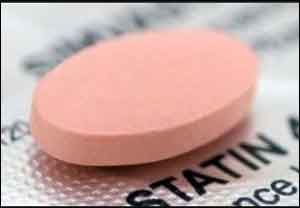- Home
- Editorial
- News
- Practice Guidelines
- Anesthesiology Guidelines
- Cancer Guidelines
- Cardiac Sciences Guidelines
- Critical Care Guidelines
- Dentistry Guidelines
- Dermatology Guidelines
- Diabetes and Endo Guidelines
- Diagnostics Guidelines
- ENT Guidelines
- Featured Practice Guidelines
- Gastroenterology Guidelines
- Geriatrics Guidelines
- Medicine Guidelines
- Nephrology Guidelines
- Neurosciences Guidelines
- Obs and Gynae Guidelines
- Ophthalmology Guidelines
- Orthopaedics Guidelines
- Paediatrics Guidelines
- Psychiatry Guidelines
- Pulmonology Guidelines
- Radiology Guidelines
- Surgery Guidelines
- Urology Guidelines
Statins cut risk of stroke in cancer patients after radiotherapy

Statins after head, neck and thorax radiotherapy cut the risk of stroke in cancer patients, revealed a study published in the Journal of American Heart Association.
The study demonstrated a strong trend toward reducing the primary cardiovascular and cerebrovascular outcomes with a significant reduction of 32% for the outcome of stroke alone after statin use post head, neck and thorax radiotherapy in cancer patients.
The research took into account radiation‐induced atherosclerosis which is one of the risk determinants for cardiovascular and cerebrovascular occurrences as well as the lack of evidence of the use of statin in managing cardiovascular risks in cancer patients.
The authors conducted a retrospective cohort study within a provincial linked database of 5718 cardiac patients with thorax and head or neck cancer having undergone radiotherapy between 2000 and 2011. One thousand five hundred fifty‐two patients were identified as nonstatin users and 4166 as statin users.
The primary outcome of interest was the composite of cerebrovascular (transient ischemic attack, and fatal or nonfatal stroke) or cardiovascular events (fatal or nonfatal myocardial infarction). Time‐dependent Cox proportional hazard analyses were performed.
The crude event rate was 10.31% for nonusers and 9.03% for statin users, over a mean time to event/censoring of 534±687 days for nonusers and 594±706 days for the statin users. After adjusting for age, sex, prior history of stroke/transient ischemic attack or myocardial infarction, diabetes mellitus, dyslipidemia, atrial fibrillation, chronic kidney disease, heart failure, and hypertension, statin use postradiotherapy was associated with a nonsignificant 15% relative risk reduction, but a strong trend toward reducing the primary outcome. The use of statins was associated with a significant reduction of 32% for the outcome of stroke alone.
The study concluded that statin use post radiation therapy was associated with a significant reduction in stroke, with a trend toward significantly reducing cardiovascular and cerebrovascular events.
For reference, click on the link

Disclaimer: This site is primarily intended for healthcare professionals. Any content/information on this website does not replace the advice of medical and/or health professionals and should not be construed as medical/diagnostic advice/endorsement or prescription. Use of this site is subject to our terms of use, privacy policy, advertisement policy. © 2020 Minerva Medical Treatment Pvt Ltd